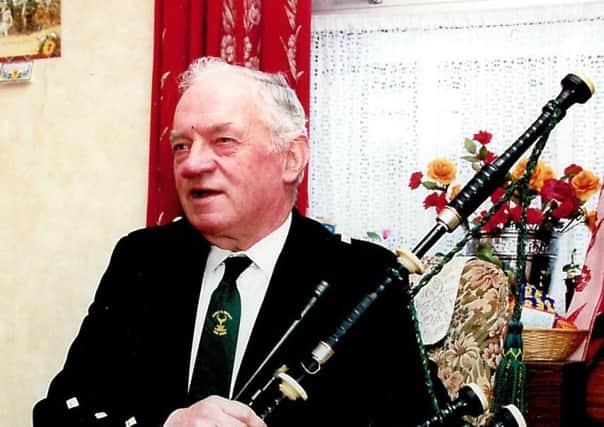Obituary: James Horne, piper


When Jimmy Horne volunteered to take up piping he had no idea it would lead to performances for generations of royalty.
He was a young private serving with the Gordon Highlanders when he stuck his hand up in response to the pipe major’s call for new recruits. Nearly 70 years later he still had not run out of puff – a fact that came to the notice of the Queen at Balmoral.
Advertisement
Hide AdAdvertisement
Hide AdThe monarch, after reportedly reading a newspaper account of his talents with Huntly and District Pipe Band, was said to have been incredulous over the claim that he could still play the pipes in his 90th year. After being assured that that certainly was the case, she promptly issued an invitation through an equerry to her Highland home.
Though the entire band performed for the sovereign and her granddaughters Princesses Beatrice and Eugenie a week later, on the Glorious Twelfth 2008, and had a private audience with Her Majesty, it was clear that the invitation was Horne’s. When he was introduced to the Queen, he was able to tell her that he had also played for her father, King George VI.
Horne, who is also said to have performed for Winston Churchill, was serving in Orkney in the early years of the Second World War, when George VI visited the Home Fleet. The young piper, the son of a wood carter, was a farm servant who grew up in rural Aberdeenshire and had joined up at the start of the conflict. After serving on defence duties in Orkney he was deployed to Burma and transferred to a tank regiment where, as a highly-regarded tank driver, he saw action against the Japanese.
After one particularly brutal encounter he returned, bloodied and clearly injured, to be told by his commanding officer to ensure he got medical treatment. Defying the instruction, he simply washed his face and hands and headed back to the battlefield, insisting that there were others much more in need of assistance. During home leave from the Army, in May 1942, he married his wife Dolly, also from Forgue, and spent some of the latter part of the war in Italy. After being demobbed he returned to his native north-east and worked as a farm servant in the Huntly area until 1957 when the whole family, which by now included three sons and a daughter, moved to Australia. He already had relatives there and settled in Brisbane where he worked for the local council.
However, two years later the family returned home and he went back to farm work, this time as a grieve at Corse, near Huntly. Then, by 1964, he and Dolly took on a farm of their own at Ythanwells, east of Huntly, where they later acquired neighbouring land, eventually extending the farm to more than 100 acres.
Despite the relentless work of farming, he never forgot his love of the pipes and, on his return from war, he was one of the founders, in 1948, of Strathbogie Pipe Band. Formed by Gordon Highlanders, it later became Huntly and District Pipe Band. He was 89 when it celebrated its 60th anniversary in 2008 and, despite a hip replacement, he still joined them on a celebratory march through the town.
Over the years he had performed abroad many times – in Spain, France, Germany and, most poignantly, in Belgium where on several occasions he played at the Menin Gate memorial to the Great War dead in Ypres.
In 1994 he played for Prince Charles when the Prince of Wales opened a new bakery at shortbread manufacturer Deans of Huntly.
Advertisement
Hide AdAdvertisement
Hide AdAfter retiring from the land when he was in his 70s, he remained in demand as a piper at weddings and Burns suppers. He was also an accordionist and a keen bowler. Along with Dolly, he was heavily involved in the community, helping out and supporting local charities.
The last surviving playing member of those who founded the band, he was accompanied on his final journey by his fellow pipers, who escorted him from the church to the cemetery, formed a guard of honour and then ensured he was watched over by a lone piper after being laid to rest.
Modest, unassuming and deeply-loved by his community, he was predeceased by Dolly and their daughter Sheila and is survived by his sons James, Robert and Ronald, six grandchildren and five great-grandchildren.
ALISON SHAW